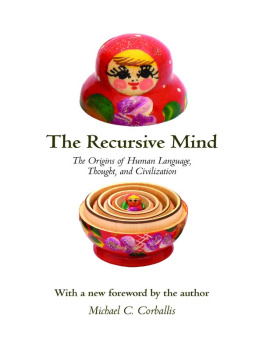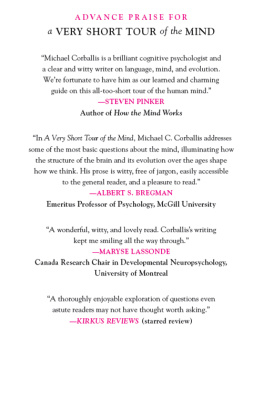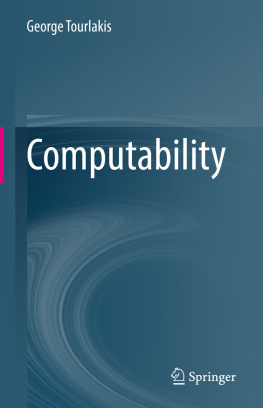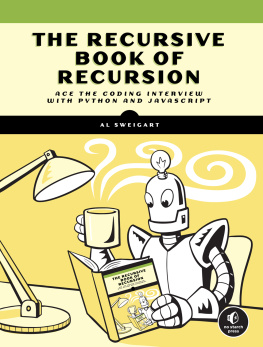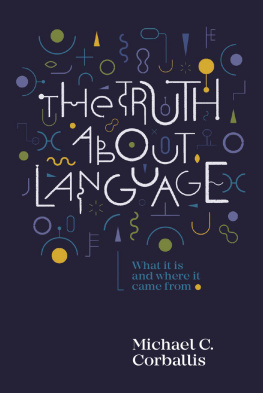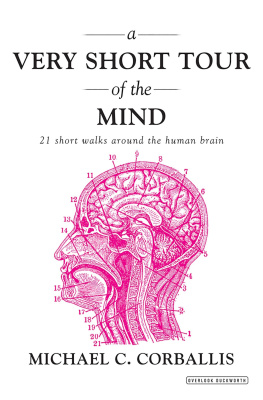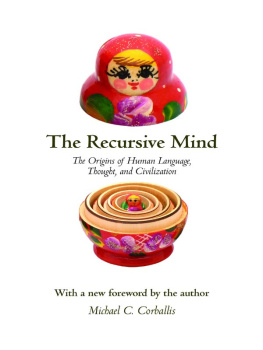
The Recursive Mind
_______
The Recursive Mind
________
The Origins of Human Language,
Thought, and Civilization
Michael C. Corballis
PRINCETON UNIVERSITY PRESS PRINCETON AND OXFORD
Copyright 2011 by Princeton University Press
Published by Princeton University Press, 41 William Street,
Princeton, New Jersey 08540
In the United Kingdom: Princeton University Press, 6 Oxford Street,
Woodstock, Oxfordshire OX20 1TW
press.princeton.edu
All Rights Reserved
Third printing, and first paperback printing, with a new foreword by the author, 2014
Paperback ISBN 978-0-691-16094-8
The Library of Congress has cataloged the cloth edition of this book as follows
Corballis, Michael C.
The recursive mind : the origins of human language, thought, and civilization / Michael C. Corballis.
p. cm.
Includes bibliographical references and index.
ISBN 978-0-691-14547-1 (cloth : alk. paper)
1. Evolutionary psychology. 2. Human evolution.
3. BrainEvolution. 4. Language and languagesOrigin. I. Title.
BF701.C665 2011
155.7dc22 2010043084
British Library Cataloging-in-Publication Data is available
This book has been composed in Sabon LT Std text with Scala Sans OT Condensed display
Printed on acid-free paper
Printed in the United States of America
10 9 8 7 6 5 4 3
Contents
____
Foreword to the Paperback Edition
____
The rather biblical notion that we humans were miraculously gifted language seems to persist unabated. In a recent popular and engaging book, published in 2012, the distinguished paleoanthropologist Ian Tattersall wrote as follows:
Our ancestors made an almost unimaginable transition from a non-symbolic, nonlinguistic way of processing information and communicating information about the world to the symbolic and linguistic condition we enjoy today. It is a qualitative leap in cognitive state unparalleled in history. Indeed, as Ive said, the only reason we have for believing that such a leap could ever have been made, is that it was made. And it seems to have been made well after the acquisition by our species of its distinctive modern form.
How lucky we were, you might think, to receive this blessing. Without it, you wouldnt be reading this book.
In the first edition of this book, I tried to broaden the discussion as to what makes us human by arguing that recursion, often considered the critical component of language that distinguishes it from communication in other species, applies not only to language, but to other aspects of human thought. These include the recursive ability to insert the thoughts of others in our own thoughts and to insert past or future experiences into current experience, otherwise known as mental time travel. These considerations led me to suppose that recursive thinking, and indeed language itself, probably evolved gradually over the past six million years or so of hominin evolution, and that some elements of recursive thinking may even be present in great apes. In short, we dont need to appeal to sudden miracles.
The problem with attempts to explain the human condition, though, is that the evidence keeps nibbling away at ones hard-won conclusions. In my case, as I perhaps should have anticipated, the nibbling was done by rats. For some years, Thomas Suddendorf and I had argued that mental time travel was unique to humans The titles of these books tell their stories.
But other mammals, and even birds, have hippocampi. It has long been known that the hippocampus of the rat contains cells that respond when a rat is in a particular location in some environment, such as a maze. These cells are known as place cells. It transpires that these cells fire in sharp-wave ripples when the rat is removed from that environment, and that the sequence of firing effectively maps out a trajectory in the environment. Sometimes the trajectory is one the animal had previously traversed, but sometimes it is the reverse of that trajectory, and sometimes it is a trajectory unrelated to one actually traversed. It seems that the rat is mentally reliving a past experience, or imagining a future one, or perhaps even indulging in a peripatetic fantasy. Early in 2013, I wrote a short paper suggesting that rats could travel mentally in time, embedding past and perhaps future episodes into the present.
I have little doubt that our own mental time travels are more complex and more interesting. Moreover, we can talk about our mental time travels; indeed, I suggest in the book that language evolved precisely to enable us to communicate about the nonpresentevents that do not take place in the here and now. Rats, on the other hand, cant talk, and must therefore keep their mental time travels to themselves. To find out about them, neuroscientists had to insert electrodes into their hippocampi. The results remind us that we should always be wary of assertions about human uniqueness. The origins of mental time travel may go back much further in evolution than I suggest in the book. So far, that is my only reservation, but it pays always to watch out for rat nibblings.
Notes
. Tattersall, I. 2012, 199.
. Wearing 2005.
. Corkin 2013.
. Corballis 2013.
Additional references
Corballis, M.C. 2013. Mental time travel: A case for evolutionary continuity. Trends in Cognitive Sciences, 17, 56.
Corkin, S. 2013. Permanent present tense. New York: Basic Books.
Tattersall, I. 2012. Masters of the planet: The search for human origins. New York: Palgrave Macmillan.
Preface
____
We humans like to think that we have capacities that make us not only distinct from all other creatures on the planet, but also superior to them. What other species, you might ask, has measured the speed of light, figured out how the universe began, invented the laptop computer, or painted a portrait? Our species has even succeeded in escaping from the planet altogether, even if only fleetingly. You might also ask, I suppose, why any other species would care to do these things, and we do need to be wary of our comfortable assumption that we are at the top of the earthly hierarchy, since it provides a too-easy justification of the appalling way we treat other animals. Lets face it: We eat them, kill them for sport, drink their milk, wear their skins, ride on their backs, ridicule them, house them in zoos, and breed them to our own specifications.
By the same token, though, it cannot be denied that our species has dominated the earth like no other. Not only do we subjugate other creatures to our needs and whims, but we also mold the physical environment to our specifications, to the point that our success may prove to be our undoing. Unless we make better use of our vaunted intelligence, we run the risk of succumbing to pollution, global warming, or weapons of mass destructionor, to think recursively, of weapons for the mass destruction of weapons of mass destruction. And yet we are biologically almost indistinguishable from the other great apes, and share a common ancestor with the chimpanzee and bonobo dating from only about six or seven million years agoa mere eye-blink in evolutionary time. In marked contrast to human triumphalism, the great apes have been forced into ever-diminishing habitats, and they too are threatened with extinction.
Many have conjectured about why our species is so dominant on the planet. Assuredly, the reason is mental rather than physicalany number of animals out there can easily beat us in physical combat. Descartes argued that only humans are capable of free will. Aristotle suggested that man is the only political animal, and history suggests that he should have included women. Thomas Willis thought that only humans were capable of laughter, while Martin Luther argued that it was the possession of property that distinguished us. Benjamin Franklin attributed human uniqueness to tool-making, and the Greek philosopher Anaxagoras said it was the human hand that made us the wisest of species. Steven Mithen recently suggested that music may have started it all. Some years ago, in my book
Next page
